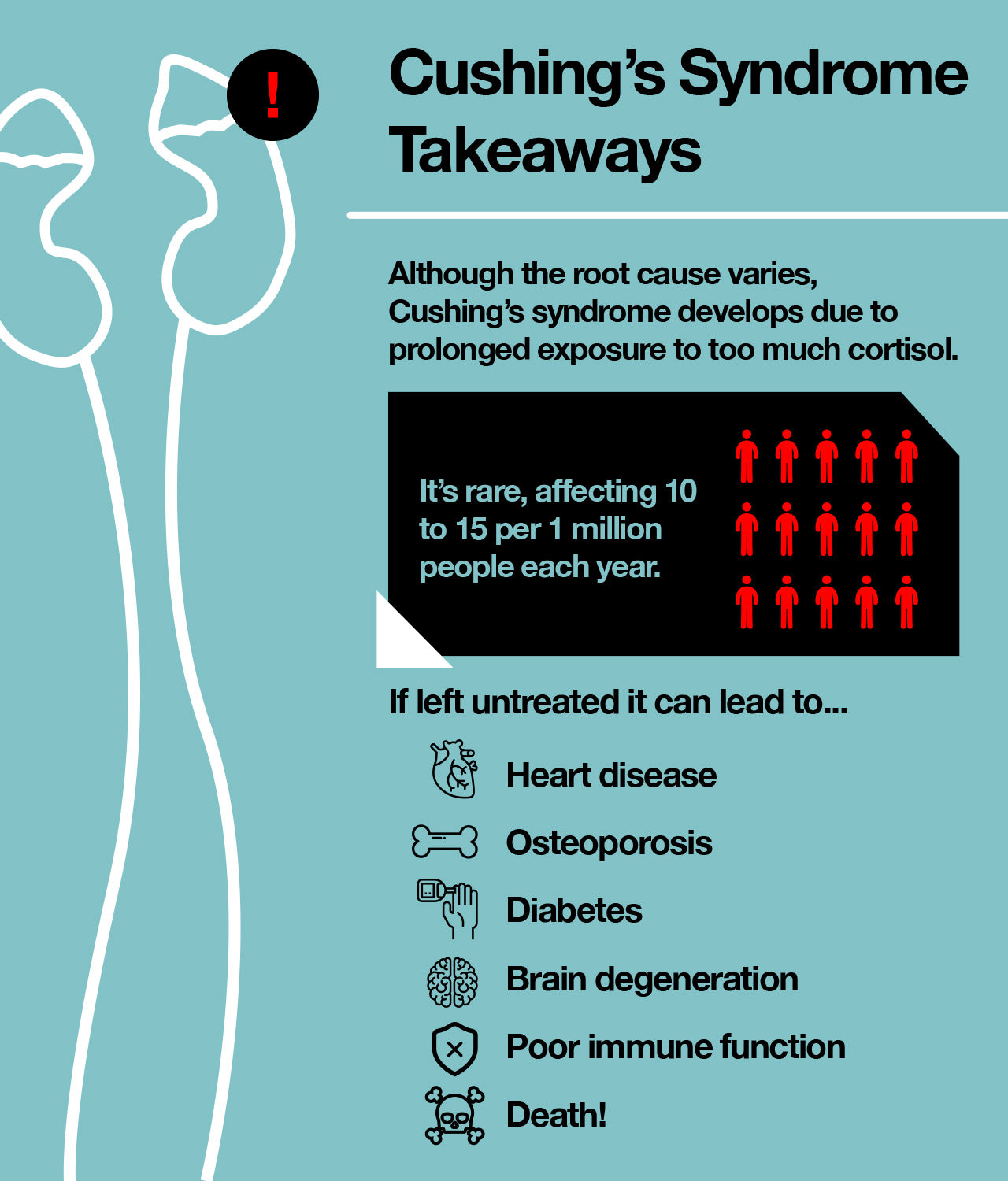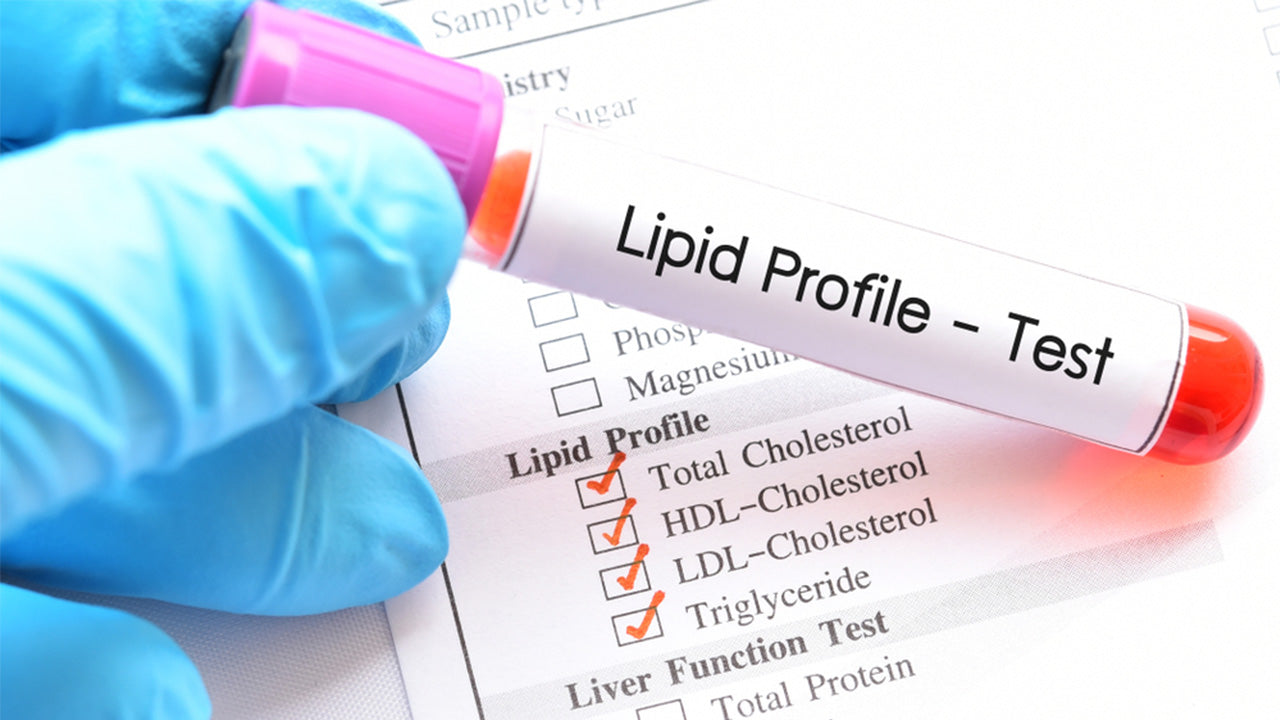What Is Cushing’s Syndrome (Hypercortisolism): Symptoms and Treatment
 By: by Amino Science
By: by Amino Science

What is Cushing’s syndrome? Cushing’s syndrome, also known as hypercortisolism, describes distinct symptoms exhibited in individuals who suffer prolonged exposure to the hormone cortisol. The condition is very rare, as it only affects 10 to 15 per 1 million people each year.
Medical professionals are strongly encouraged to maintain a high degree of suspicion when attempting to diagnose persons exhibiting Cushing’s syndrome symptoms. Cushing’s syndrome is potentially lethal, especially when its symptoms are mild. The continual exposure of the body’s tissues to abnormally high levels of cortisol can lead to very serious complications in the short as well as long term.
What Is Cortisol?
Your body produces the steroid hormone cortisol within the adrenal gland as a natural response to stress and low blood glucose levels. Cortisol increases blood sugar levels, suppresses the immune system, limits bone formation, inhibits calcium absorption in the intestine, regulates blood pressure and the body’s response to insulin, and helps the body extract energy from carbohydrates, fats, and proteins.
Most people are prone to produce higher cortisol levels than normal at certain times in their lives. Common causes for sharp, but relatively brief, spikes of cortisol in the body include:
- High-stress levels from extreme life changes or events (e.g., giving birth, sudden illness, extreme pain)
- Intense athletic performance
- Excessive alcohol consumption
- Taking birth control pills
- Mental illness (anxiety, depression, panic disorders, and chronic emotional distress)
Certainly, you should be mindful of the impact that high cortisol levels may have on your health during these types of momentary life events. The presence of excess cortisol in the body for extended periods of time, however, drastically skews normal metabolic functionality. In documented cases of Cushing's syndrome, even after hypercortisolism seemed to have been addressed medically, patients continued to experience mental and/or metabolic imbalances.
Cushing’s Syndrome Causes
Here are biological causes for Cushing’s syndrome:
- Overuse of corticosteroid medications: Patients who use high doses of corticosteroids, such as prednisone, for extended periods of time are at increased risk of developing Cushing’s syndrome. These medications are commonly prescribed to treat rheumatoid arthritis, inflammation, and lupus symptoms. Consuming steroids in low dosages does not typically cause Cushing’s syndrome.
- A tumor of the pituitary gland: Pituitary tumors, or pituitary adenomas, are usually non-cancerous, but their presence can trigger the pituitary gland to release an increase of pituitary adrenocorticotropic hormone (ACTH) that triggers the adrenal gland to secrete a proportional amount of cortisol—far more than the body needs. This specific chain of metabolic mishaps is referred to as Cushing’s disease or pituitary-dependent Cushing’s disease (PDCD). Muscle weakness, thinned skin, and easy skin bruising are common Cushing’s disease symptoms.
- Adrenal gland malformation or tumors: Abnormal adrenal glands or nodular tumors can cause the adrenal gland to produce too much cortisol.
- Ectopic ACTH syndrome: Certain non-pituitary tumors can trigger ACTH secretion as well. These include small cell lung cancer and tumors of the thymus gland, pancreas, or thyroid gland.
- Primary pigmented nodular adrenocortical disease: PPNAD is a rare cause of Cushing’s syndrome and is associated with endocrine and nonendocrine tumors. PPNAD is ACTH-independent. People with a family history of endocrine tumors may be more prone to developing Cushing’s syndrome.
Anyone who experiences Cushing’s syndrome causes can develop the disorder. PDCD, or Cushing’s disease, affects women 5 times more than men, while men are 3 times more likely than women to develop the ectopic ACTH form of Cushing’s syndrome. Adults between 20 and 50 years old are more likely to develop Cushing’s syndrome than are other age groups.
Cushing’s Syndrome Symptoms
The body responds to high levels of cortisol by exhibiting one or more of the following symptoms:
- Fatty deposits around the face (referred to as moon face)
- Fatty lump at the upper back region (referred to as a buffalo hump)
- Muscle fatigue
- Lethargy
- Easy bruising of the skin
- Surface wounds of the skin that are slow to heal
- Localized hyperpigmentation
- Purple or reddish stretch marks along the folds of the body (breasts, neck, arms, thighs, and abdomen)
- Thinned skin
- Obesity and excess weight gain, but thin arms and legs
- Acne
- Inflammation
- High blood pressure
- Headache
- Difficulty concentrating
- Depression and anxiety
- Insomnia
- Weak bones from bone loss
- Frequent urination
- Dehydration
- Decreased fertility
- Lowered libido
- Dry/brittle hair or hair loss
- Excessive hair growth
- Erectile dysfunction (in males)
- Irregular menstruation, male-pattern facial hair (in females)
Although rare, Cushing’s syndrome can manifest as poor growth and weight gain in children, especially with ACTH-independent forms of the disorder.

Cushing’s Syndrome Complications
Untreated Cushing’s syndrome can lead to serious complications, including:
- Osteoporosis: Cortisol naturally suppresses bone formation. Excess cortisol exposure can lead to bone fractures even at normal bone density levels.
- Cardiovascular disease: The presence of high cortisol levels in the blood can increase the risk for hypertension (or high blood pressure) and atherosclerosis (arterial stiffness due to plaque buildup along arterial walls). Metabolic mechanisms leading to hypertension are common with ectopic ACTH secretion. Cardiovascular diseases can lead to heart attack or sudden cardiac death.
- Diabetes: Obesity and insulin disorders can increase the risk of type 2 diabetes in Cushing’s syndrome patients.
- Brain degeneration: Excess cortisol can alter cognitive function and brain anatomy. Cushing’s syndrome-linked cerebral atrophy is caused by an excessive loss of brain tissue due to high concentrations of glucocorticoids in brain receptors. Even when biological causes for hypercortisolism have been addressed, a prolonged exposure to cortisol can cause severe mental damage that includes chronic depression and behavioral changes. Patients may continue to experience adjustment issues during Cushing’s syndrome remission.
- Poor immune system function: Over time, the body can fail to respond normally to infection onset. Gastrointestinal disorders, invasive infections, and suppressed immune responses are results of too much cortisol exposure. The body succumbs to ordinarily curable illnesses much faster with a compromised immune response.
Cushing’s Syndrome Treatment
It is very important to diagnose Cushing’s syndrome early on, as the condition tends to progress and the risk for mortality increases, especially from cardiovascular issues and insidious infections. Patients can expect to live a normal lifespan with adequate treatment. If you experience Cushing’s syndrome symptoms, seek prompt medical attention.
Your doctor will review your medical history and symptoms, and administer a physical examination—including digital medical imaging. Laboratory tests include cortisol tests without urine samples, measuring plasma cortisol levels, measuring salivary cortisol levels, and the dexamethasone suppression test.
Treating Cushing’s syndrome usually involves addressing the cause of excess production of cortisol. If you are using corticosteroids that may trigger Cushing’s syndrome symptoms, it is important that you seek medical counsel before altering your dosage. Surgically removing tumors or entire gland tissues (e.g., adrenalectomy, transsphenoidal pituitary adenectomy) is also a common remedy. Sometimes the adrenal glands are removed when a tumor cannot be detected in order to halt excess cortisol production. Chemotherapy or radiation therapy is another invasive remedy. Other treatment options include prescribed medications to suppress the effects of cortisol on your body, with or without the need for more invasive methods, although they carry the risk of side effects. Some medications can substantially limit cortisol or ACTH production.
High cortisol levels can impair the body’s response to the muscle-building effects of essential amino acids from dietary protein. Supplementing with 15 grams of essential amino acids, however, has been proven to activate muscle protein synthesis and protect against muscle loss when cortisol levels are elevated.
In patients with Cushing’s disease or PDCD, researchers have suggested that normalizing levels of sulfur amino acids (SAAs) is a key component to long-term remission while decreasing cardiovascular risk. When undergoing Cushing’s syndrome treatment, it is important to adhere to your particular treatment plan. The effects of treatment may appear slow at first, as your hormone levels stabilize and your body re-establishes more balanced metabolic functions.

Up to 25% off Amino
Shop NowTAGS: conditions
Join the Community
Comments (0)
Most Craveable Recipes




 833-264-6620
833-264-6620



















